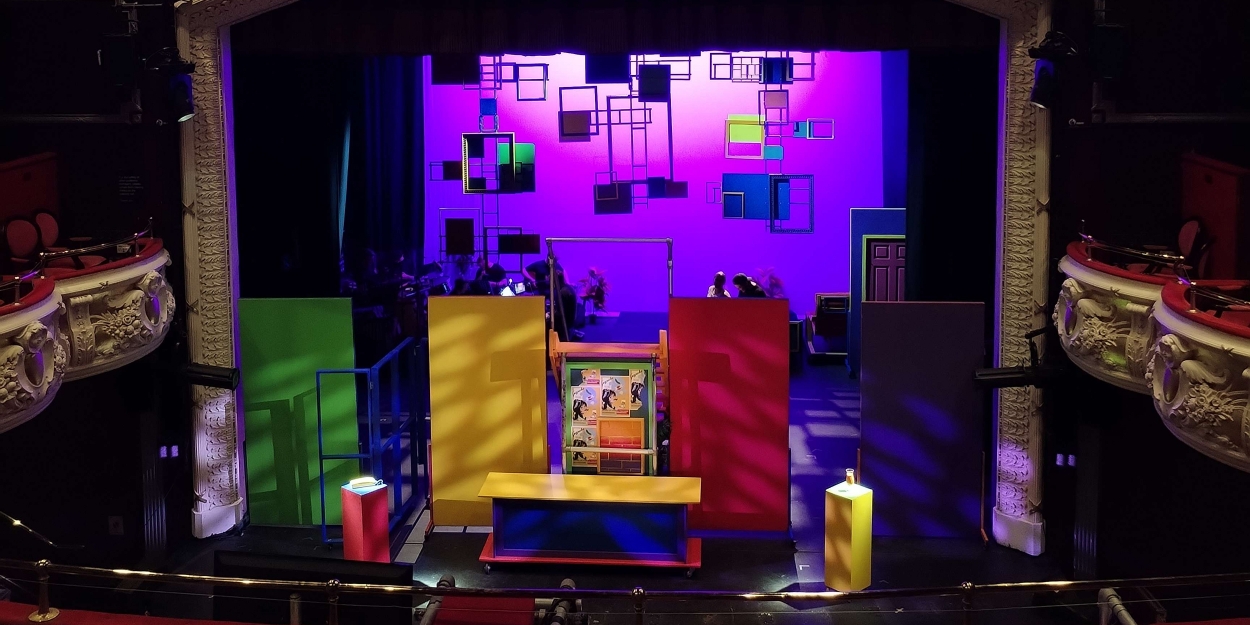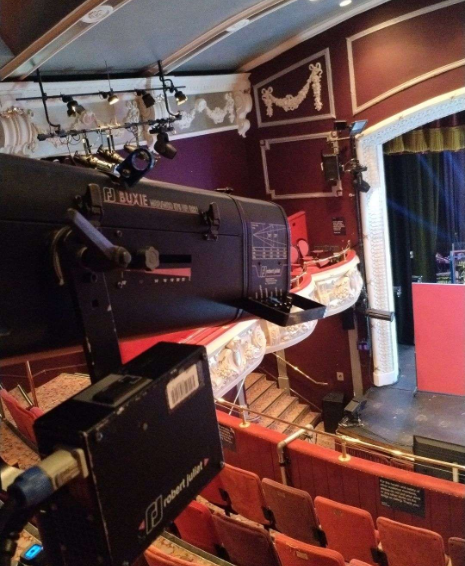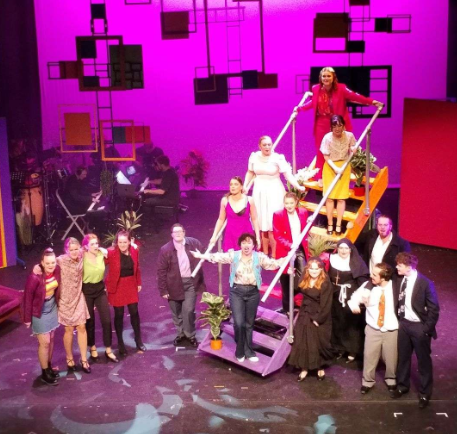Student Blog: A Theatre Kid Behind a Follow Spot
I share my experience as a 2nd year musical theatre student with no tech experience being a follow spot operator for the first time in a full-length musical.

Just this weekend, from the 10th to the 11th, we completed the third year’s run of Women On The Verge of a Nervous Breakdown. Show days went by so quickly; some part of me still feels like I have to be there for my 12.30 call time. It was an opportunity that I will be eternally grateful for and a brilliant experience to go on my CV for sure. I truly didn’t think university would take me down so many different pathways in theatre, especially with the expectation that my degree would confine me to just musical theatre, but I’m so lucky to be surrounded by a faculty who strives on giving their students every possible opportunity they can get so, I have them to thank for this.
Now, so full with gratitude, I share my experience as a 2nd year musical theatre student with no tech experience being a follow spot operator for the first time in a full-length musical.
I had taken up the gig the week before returning to classes during our Easter break and on that Friday, it was recommended that I sat in for rehearsals to meet the team as well as observe the show to familiarize myself with it as much as I could. They were just starting on Act 2 so the most catching up I had to do was mainly for act 1 of the show. The theatre production team were friends of mine, having met them during our first year devising showcase as they were the ones teching our show, so it was like a full circle for us, now working in the same department. It was so surreal sitting in the creative panel among my lecturers and the production team as I’m so used to being the one on the floor, and everyone around me made sure that I was up to date with certain things that included the day’s schedule and the coming schedule for the weeks leading up to the show. I was briefed on what my job entailed, who my supervisors were and how to make notes while I was observing, which made the task a lot less stressful with how accommodating everyone was around me. I was not treated as if I was oblivious to my job despite having no experience compared to the rest of the production team, and it made the job all the easier as I didn’t feel the pressure I anticipated.
Sure, it was still terrifying doing something in a professional production that I’ve never done before but it’s what makes the experience.
Since then, I was going in and out of the rehearsal room early in the morning before my classes, between classes when I have a break and after classes. The only times I’d find myself unavailable outside of class times was when I had extra rehearsals or self-tapes for my assessments; there was much to balance. Whenever I thought I was missing out, our deputy stage manager (DSM) came in clutch with a folder of recordings from every rehearsal session for every new number/scene or new blocking for an existing bit. I was reliant on the godsent platform that is OneDrive. I could still take notes in my bedroom after a long day of classes; I felt so pampered. That was basically the cycle of my schedule depending on how the weeks went with all the prep I had to brace myself for. Classes, attending rehearsal sessions, resting up, assessment preparations and follow spot tutorials on YouTube.

I was finally introduced to my follow spot on the Wednesday of show week, just two days before the show opened for the Friday matinee. I had the best spot in the theatre all to myself which was the very top of the circle. Just me, a manuscript stand, my cue sheet, the production team in my ear over comms and my spotlight. I was taught how to use it very quickly as there were only two levers for me to know; brightness and iris. There was nothing for me to worry about at all with everything handed to me, so I had to do the team proud.
For the final few days, we spent it plotting lighting with our lighting director which, I won’t lie, was nerve-wracking as it meant I would have very little time to learn all the cues by the show but believe me or not, it was so much easier than I thought. I got to bask in the minds of the creative team, inside-out, and it made me appreciate the craft of theatre so much more beyond being a performer.
There was not much else for me to prepare for, but to be flexible and responsive to the performers on stage as not every show was going to be the same. In between runs, I had to run through my script for my acting assessment so there was much else in the process for me to deal with. I was anxious, nonetheless, but after the first two tech runs, I knew I was going to have the time of my life. Receiving my cue sheet on the day of our full-dress runs was the most exciting day. Something about it really solidified how real all of this was and I would actually be doing this. I got my highlighters out to color-coordinate everything, as I normally do, and made little notations from my notebook onto the page to personalize it. Nothing makes me more anxious than a clean page; especially with sheet music or a script.

My favorite number to spot for was Model Behavior, which I was warned is the fastest number in the show and would have a lot of work, but I had the time of my life. I had less to spot for the closing number of Act 1, On The Verge, but it gave me the chance to watch it every night and I would have my own jig in my little corner.
Funny enough, what helped me prepare for this role was mainly from the amount of shooter games I’ve played across my childhood up until now. It felt like the very same except this time I knew where I had to aim for and I would be cued which is not as spontaneous as the shooter games. It’s silly how the most unconventional things can prepare you for something that is completely unrelated to it, but a very cool handy thing to have that many things connect the way they do. Our lecturers have encouraged us to find skills in our day-to-day lives to bring into our careers, strange as they are, and I’m starting to believe it more than ever.
When show days arrived, we would start with a little circle time with cast and crew, have a short brief and a cheer for everyone then get on with the show. The cycle was the same across the shows but on the final day, it was an emotional afternoon. We were gathered on stage and the third years took a moment to express their gratitude to everyone. Everyone was gifted cards, hugs went around and there were a lot of tears. Then, it was the lecturers’ turn. I knew I would be returning for 3rd year soon but it was difficult holding back the tears knowing I won’t be seeing the company anymore, most of who I was friends with. I did get told off by my lecturer, jokingly, that it wasn’t my last year. I still cried at the end of the matinee, and a little more after the evening show, and eventually I was all out of tears.
I cannot imagine what I might be like for my final showcase having cried as much as I did for this one. It’s quite terrifying just thinking about it when we eventually have to say goodbye.
As I write this, I still can’t believe I got to do all of that for the remainder of my second semester in my second year. If I’d graduated without this experience, I would not have known where to start my tech endeavours at all. My lecturers jokingly said that I would have to do it again for my final showcase, and honestly, I would love nothing more.

Comments
Videos


